Applying for SSDI can be overwhelming, especially with the confusing eligibility criteria many applicants face. While SSDI is a federal program, each state, including New York, has its own specific guidelines and processes for evaluating claims. Understanding these requirements can be the difference between a quick approval and a frustrating denial.
Your SSDI eligibility requirements in New York are based on a combination of work history, medical condition, and recent employment status. Unfortunately, over 60% of initial SSDI claims made in the Empire State are denied due to incomplete or inaccurate information. To increase your chances of approval, it is essential to provide clear, compelling evidence that your disability significantly limits your ability to work.
Key Takeaways From the Blog
- SSDI eligibility in New York is based on federal medical and work history rules.
- Your claim is reviewed by New York’s Disability Determination Services (DDS), not the SSA directly.
- To qualify, you need to have significant long-term medical conditions and enough recent work credits.
- You must submit medical records, earnings history, and SSA-required forms.
- If denied, you can appeal through up to four review stages.
- Approved applicants receive monthly payments, back pay, and Medicare after 24 months.
What Is SSDI and Who Administers It?
Social Security Disability Insurance (SSDI) is a federal program that provides monthly payments to disabled individuals who can no longer work due to a serious medical condition. It is funded through employees’ payroll taxes.
To qualify, you must meet two requirements:
- Medical: A condition that prevents substantial work activity.
- Work history: Enough recent work credits based on age.
While the SSA manages SSDI nationally, Disability Determination Services (DDS) in New York reviews your records and decides if you qualify. SSDI is not the same as SSI, which is income-based and does not require a work history. Check both your medical and earnings records before applying.

What are the SSDI Eligibility Criteria (Federal Standards) in New York
To qualify for SSDI in New York, you must pass a federal screening that includes both medical and non-medical criteria. Local agencies review your records, but the standards are the same nationwide.
Medical Requirements to Qualify for SSDI
The SSA checks if your condition prevents full-time work now and in the near future. It must interfere with daily activities and be expected to last at least 12 months or else result in death.
To meet the medical standard, your condition must:
- Significantly limit your ability to perform basic tasks like walking, standing, or focusing.
- Be supported by medical records, imaging, or test results.
- Match a condition in the SSA’s Blue Book or create a similar level of functional limitation.
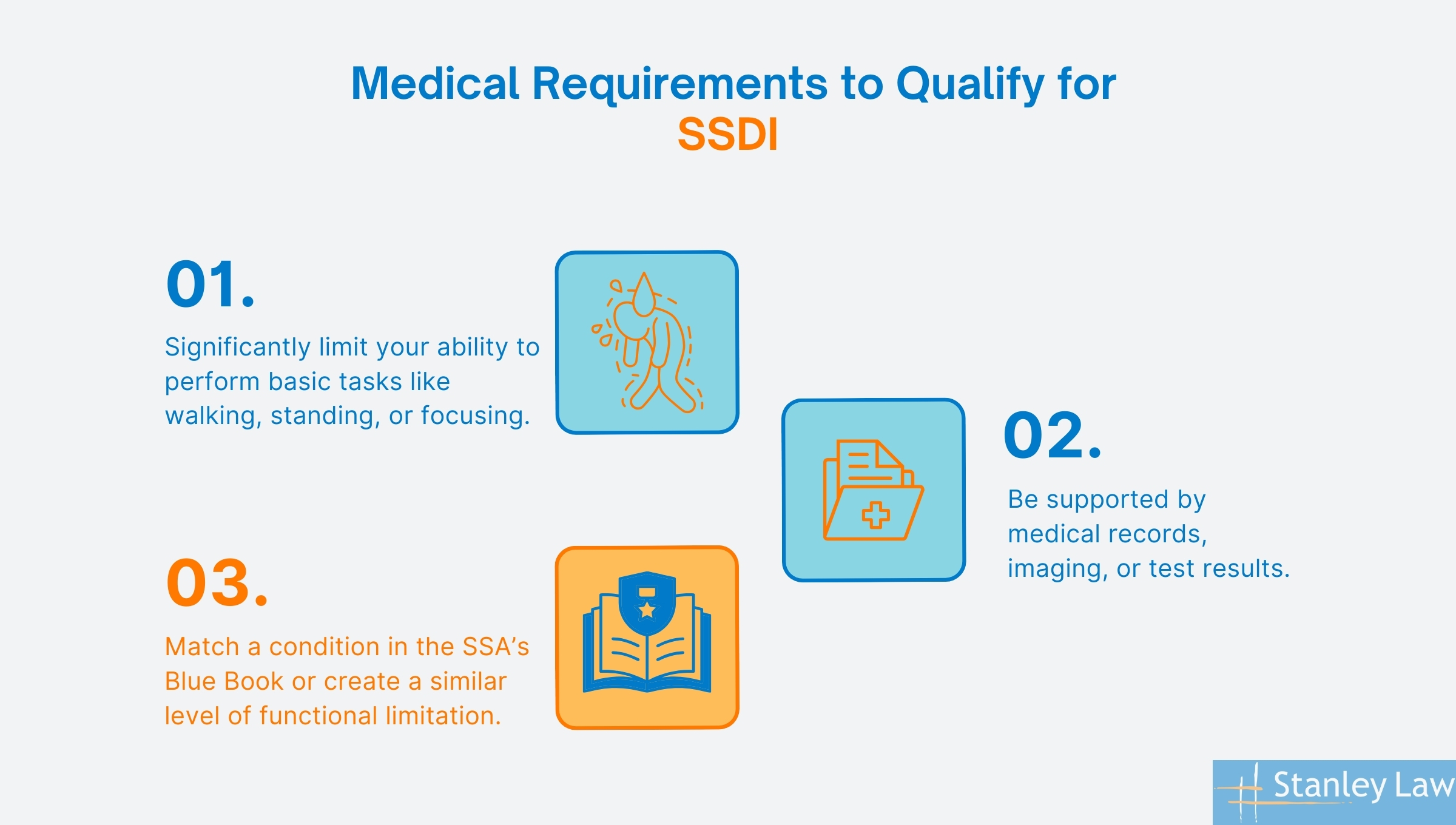
Non-Medical Requirements: Work Credits and Earnings History
To meet SSDI’s non-medical requirements, you must have enough work credits and stay below income limits when applying.
As of 2024, you earn 1 credit for every $1,730 in wages, up to 4 credits per year. Most people aged 31+ need 20 credits from the last 10 years. Younger workers qualify with fewer credits depending on age. You must not earn above the Substantial Gainful Activity (SGA) level of $1,550/month ($2,590 if blind). If you do, your claim will be denied. Check your SSA earnings statement to confirm your credits, and make sure all countable income, such as wages or self-employment, is below the SGA limit.
Check out our detailed guide on “What are Work Credits?“
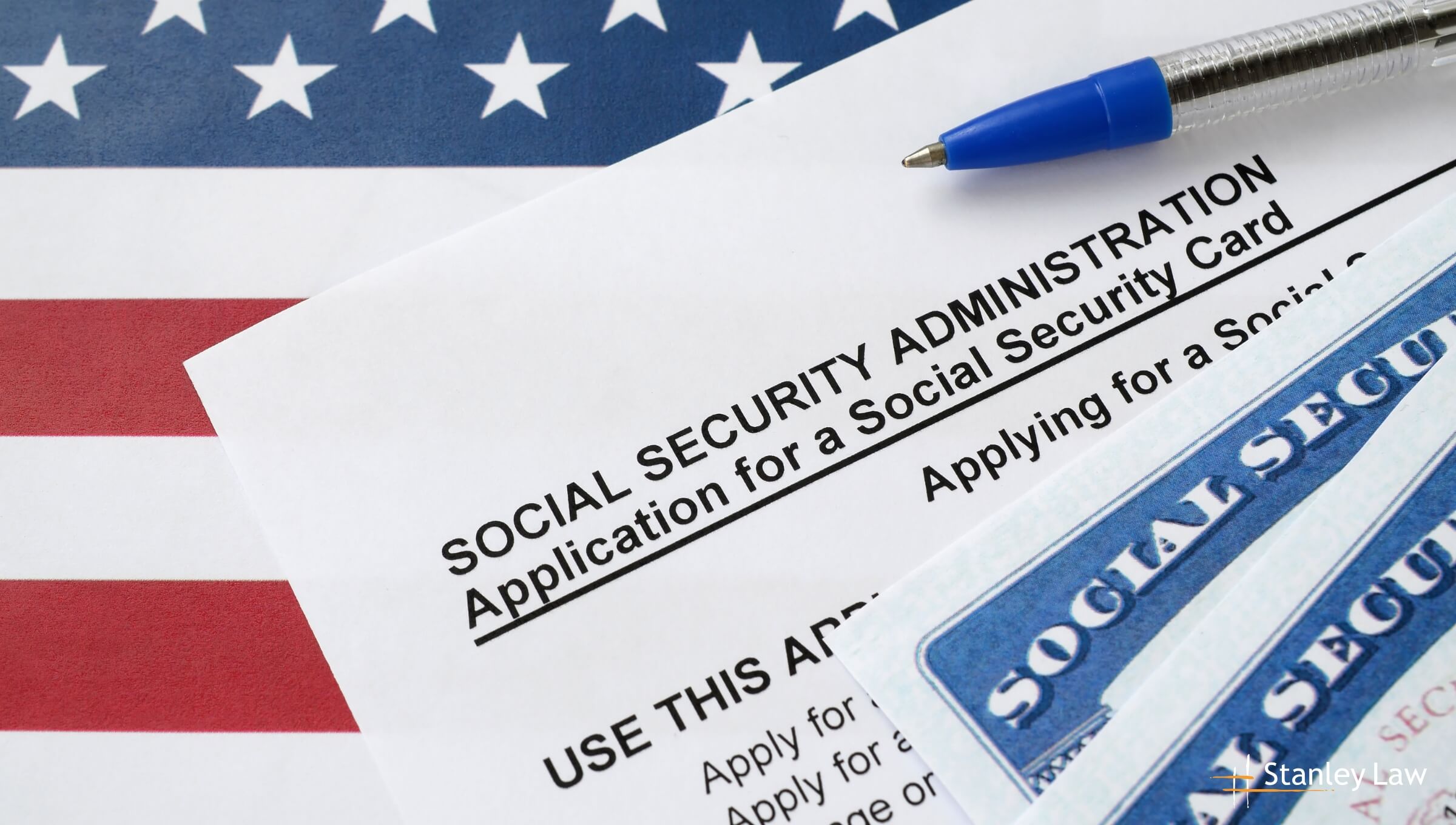
How SSDI Applications are Evaluated in New York
Once you apply for SSDI, your case is sent to New York’s Disability Determination Services (DDS). DDS reviews your medical records, work history, and statements from doctors or family members. They assess not just the official medical diagnosis, but also how your condition limits your ability to work.
Most decisions take 3–6 months. In some cases, DDS schedules a consultative exam if your records are unclear. All findings are used to decide if you meet federal disability rules.
Tip: Respond quickly to any DDS exam requests to avoid delays.
What Documents do You Need to Prove SSDI Eligibility in New York?
To prove you meet SSDI eligibility in New York, you will need four types of documents covering your medical condition and work history.
Medical Documentation: Doctor’s notes, MRIs/X-rays, hospital discharge summaries, and prescription records.
Work and Income Proof: Recent pay stubs, federal tax returns, and SSA earnings records.
Administrative Forms: SSA-827 for record access, and an RFC (Residual Function Capacity) form from your doctor outlining your limitations.
Third Party Function Reports (Optional): Signed statements from someone who sees you regularly, explaining how your condition affects daily life.
What Conditions Automatically Qualify You for SSDI in NY?
Some medical conditions automatically qualify you for SSDI in New York if properly documented. These fall under 14 SSA-recognized categories of severe impairments:
- Musculoskeletal Disorders: Bone, joint, or muscle issues that limit movement.
- Special Senses & Speech: Hearing, vision, or speech loss.
- Respiratory Disorders: Asthma, COPD, or cystic fibrosis.
- Cardiovascular System: Heart failure or artery disease.
- Digestive Disorders: Liver or bowel diseases.
- Genitourinary Disorders: Severe kidney failure or dialysis.
- Hematological Disorders: Blood-related illnesses such as sickle cell disease or hemophilia.
- Skin Disorders: Chronic infections, burns, or other skin conditions that affect function.
- Endocrine Disorders: Diabetes or thyroid problems with serious complications.
- Congenital Disorders: Genetic conditions present from birth that impact daily life.
- Neurological Disorders: Epilepsy, multiple sclerosis, Parkinson’s disease, and others.
- Mental Disorders: Depression, anxiety, PTSD, schizophrenia, or bipolar disorder.
- Cancer Disorders: Certain cancers, especially those that are inoperable or spreading.
- Immune System Disorders: HIV/AIDS, lupus, rheumatoid arthritis, or similar diseases.
Check the SSA Blue Book to confirm your diagnosis meets listing criteria.
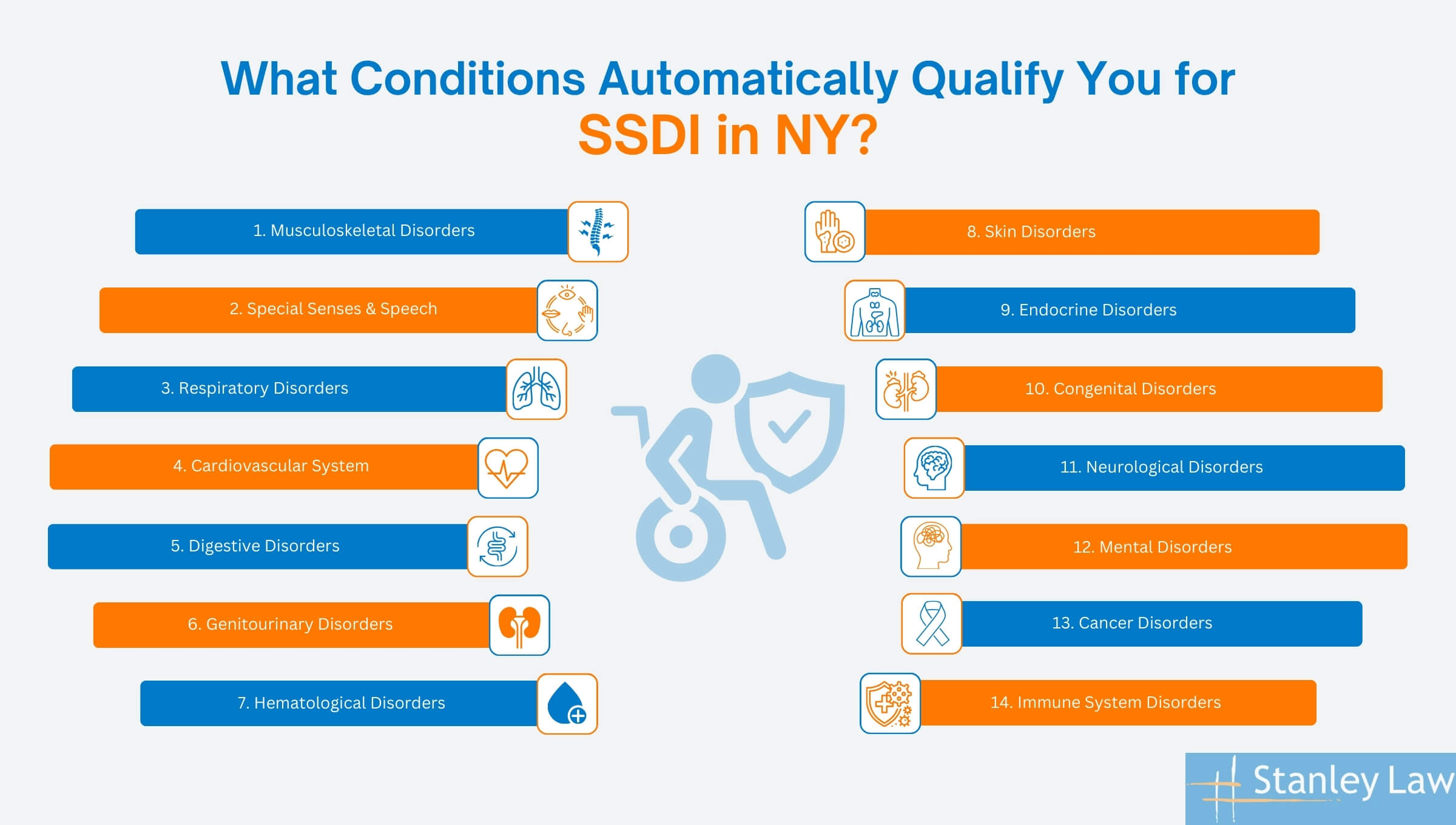
How to Apply for SSDI in New York
There are three ways to apply for SSDI in New York:
- Call the Social Security Administration at 1-800-772-1213.
- Visit your local SSA office to apply in person.
- Submit your application online at ssa.gov.
The steps are the same no matter which method you choose. If you want help preparing to get the benefits, here is our step-by-step guide on how to apply for SSDI.
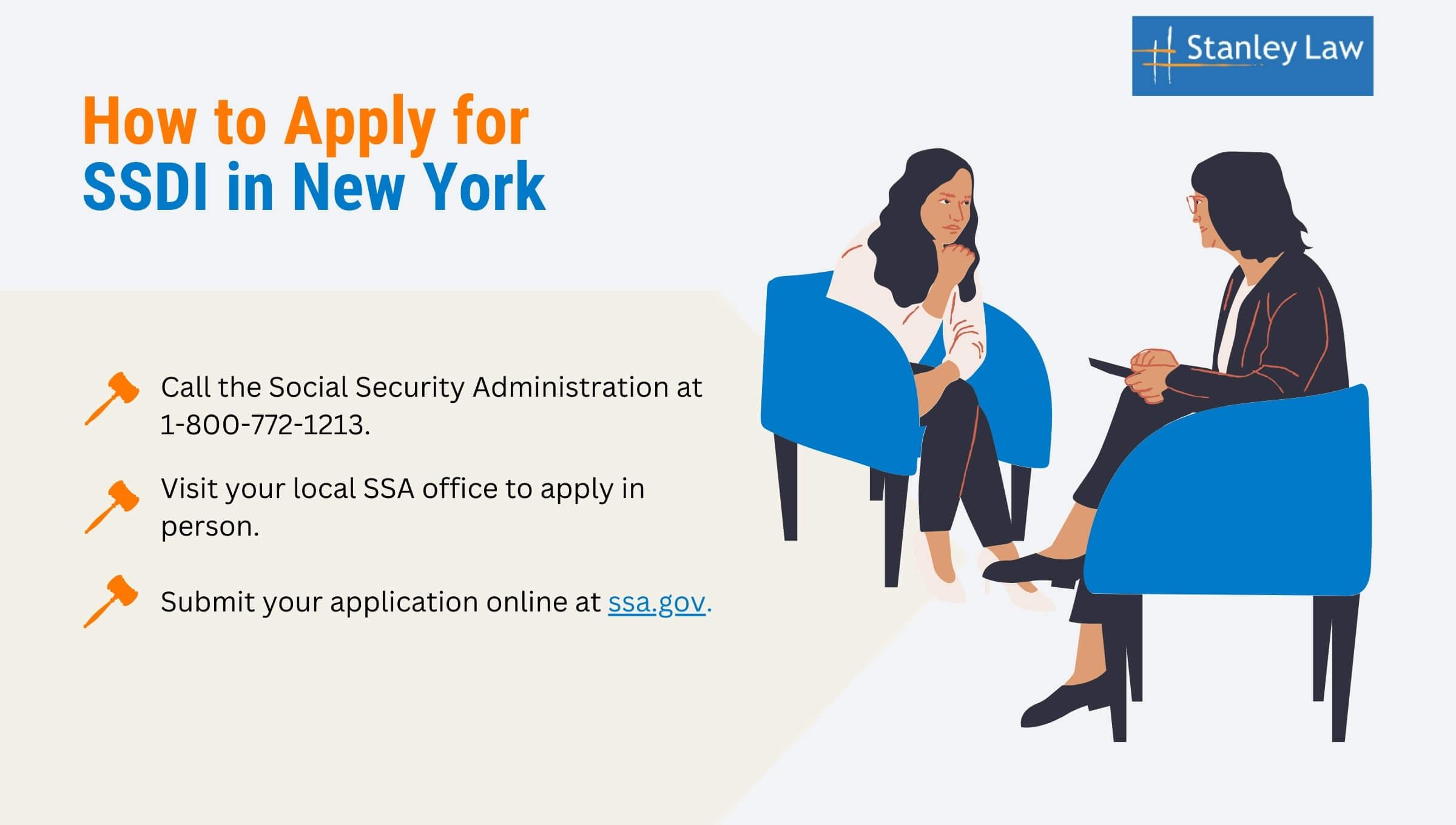
How Age, Education, and Work Background Impact Your SSDI Eligibility in NY
When your medical condition fails to meet a listed disability, the SSA evaluates other vocational factors to decide if you can still work. This includes your age, education, and past job experience, reviewed under the Medical-Vocational Grid Rules.
These rules often favor:
- Older workers: Over age 50, career change is harder, so approval is more likely.
- Lower education levels: Lack of high school or formal training limits job options.
- Unskilled job history: Physical or repetitive past jobs rarely translate to new roles.
Example: A 55-year-old laborer with no training may qualify, while a 30-year-old with a college degree may be expected to adjust.
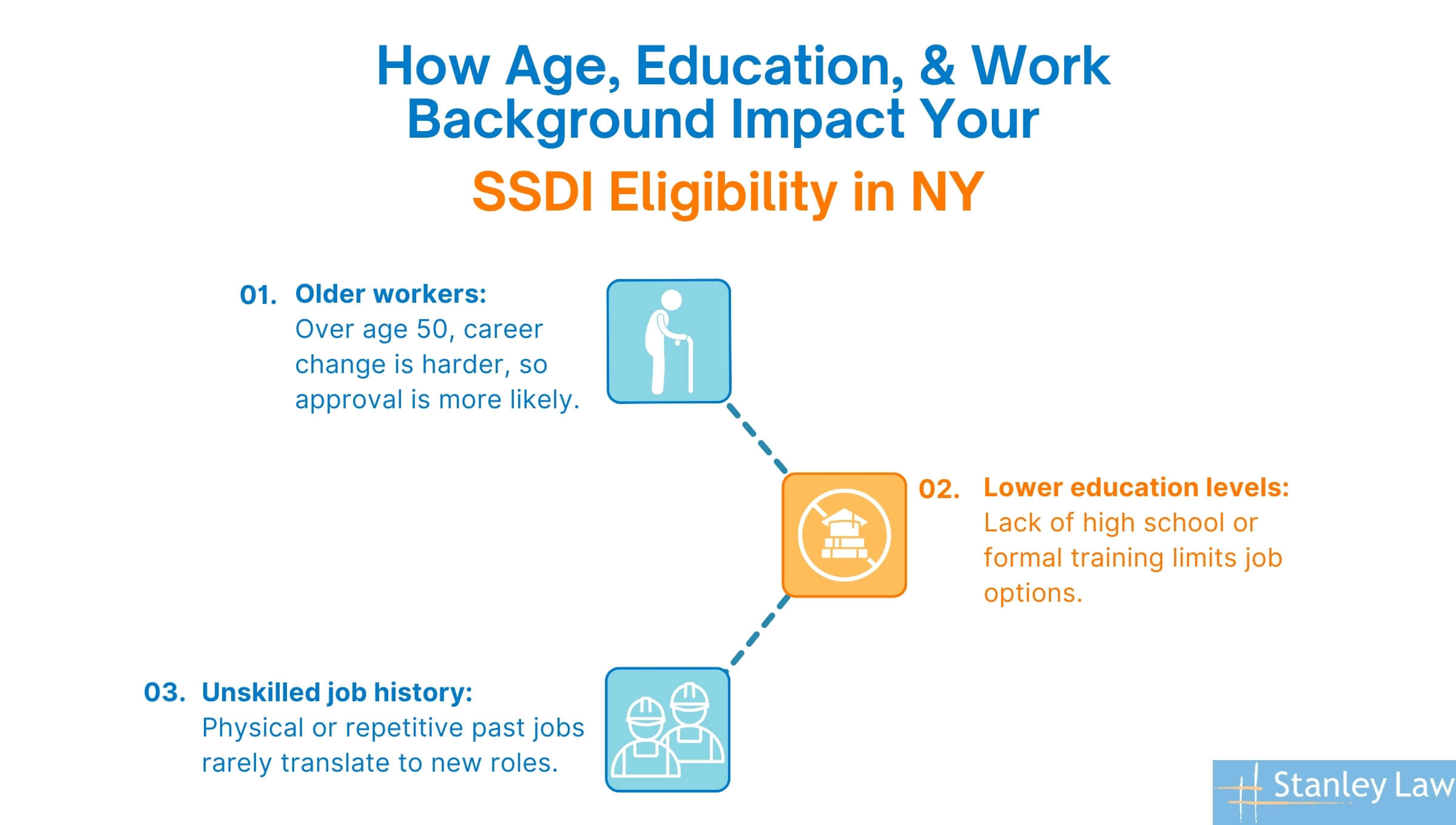
What Happens If Your SSDI Claim Is Denied in New York?
If your SSDI claim is denied in New York, you still have options. Most people begin the appeals process, which includes four levels:
- Reconsideration: A different SSA reviewer looks at your claim.
- Hearing: You present your case to an Administrative Law Judge.
- Appeals Council Review: They examine the judge’s decision.
- Federal Court: Final legal review outside SSA.
To improve your chances, update your medical records and correct any errors. Common reasons for denial include missing documentation or earning above the income limit. If your SSDI claim has been denied, our experienced New York Social Security Disability Lawyer can help you build a stronger case and guide you through the appeals process, increasing your chances of approval.
Contact us for a free consultation.
What Benefits Can You Expect If Approved for SSDI in NY?
If approved for SSDI in New York, you will receive monthly payments based on your past earnings and work history. Most people receive between $800 and $1,800 per month. You may also receive back pay from the date you filed your application.
After 24 months of SSDI payments, you become eligible for Medicare, regardless of age. Some approved applicants in New York may also qualify for state programs like SNAP or HEAP, depending on income and household size.

FAQs Related to SSDI Eligibility in New York
Can I Work Part-Time and Still Get SSDI in NY?
Yes, you can work part-time and still receive SSDI benefits if your monthly income stays below the Substantial Gainful Activity (SGA) limit, which was $1,550 for the 2024 calendar year.
How Long Does It Take to Get SSDI in New York?
It depends on your case. Most initial SSDI decisions in New York take 3 to 6 months. If you appeal, the process can take 12 months or longer.
Do I Need a Lawyer to File for SSDI in NY?
No, you do not need a lawyer to file your initial SSDI application. But legal help often improves your chances of approval, especially during appeals.
Does the SSA Consider Mental Health Conditions Seriously?
Yes, SSA considers serious mental health conditions like depression, PTSD, anxiety, or schizophrenia, if supported by clinical records and treatment history.
Talk to a New York Disability Attorney About Your SSDI Eligibility
Determine your SSDI eligibility in New York with help from our experienced attorneys. At Stanley Law Offices, we’ve helped thousands of people in upstate New York and central Pennsylvania get the disability benefits they deserve. We know how overwhelming the process can be to employees, especially if your claim was denied.
Our team builds strong cases based on facts, medical records, and work history, and you pay nothing unless we win.
Call us today. Find out where your SSDI claim stands and what steps to take next.

